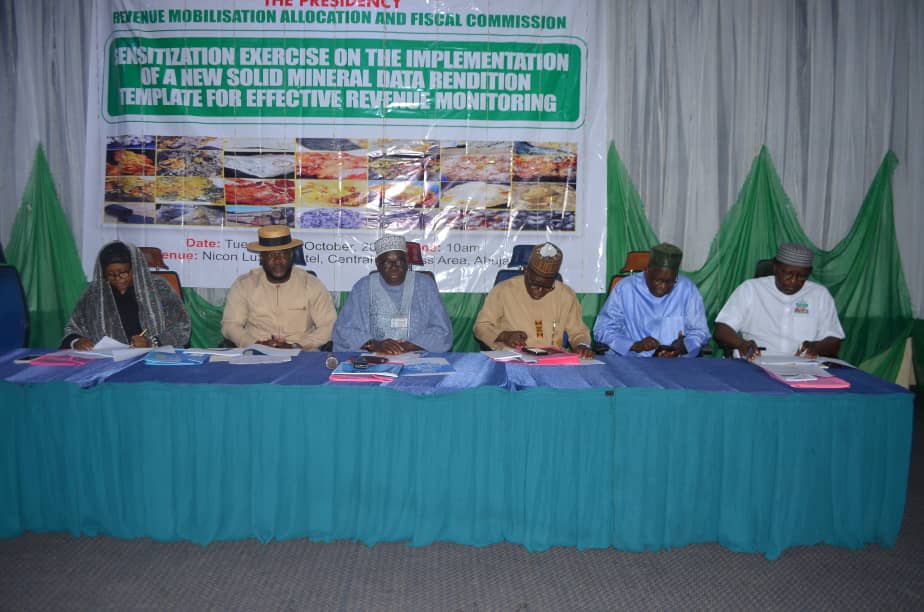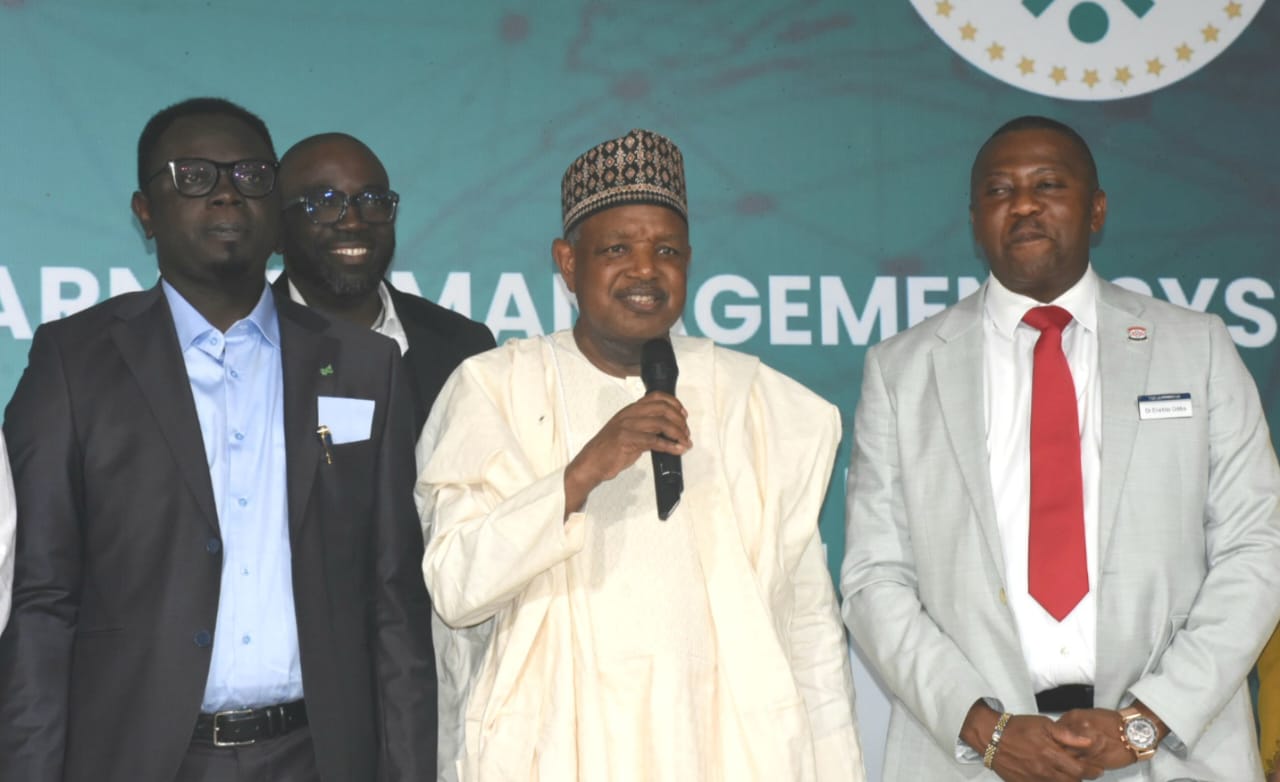Business
RMAFC Unveils New Data Rendition Template For Solid Minerals

Joel Ajayi
The Revenue Mobilization Allocation and Fiscal Commission, in conjunction with the Federal Ministry of Solid Minerals Development, has introduced a new solid minerals data rendition template for effective monitoring of revenue from the solid mineral sector in Nigeria.
Speaking during a one day sensitisation exercise on the implementation of the new template on Tuesday in Abuja, Chairman of the Commission Dr. Muhammed Bello Shehu OFR who was represented by the Chairman of the Solid Minerals Monitoring Committee of RMAFC at the occassion reiterated the Commission’s commitment to promoting the diversification of the Nation’s revenue sources in line with the Renewed Hope Agenda of President Bola Ahmed Tinubu GCFR, which aims to harness the country’s revenue potentials from other key sectors of the economy such as solid minerals, tourism, manufacturing and the blue economy.
The Chairman who underscored the importance of the new template said, “The implementation of the new data rendition template could not have come at a better time, given the current economic realities the country is facing.
The need to diversify our national revenue sources cannot be overemphasized, especially considering the nation’s over-dependence on hydrocarbon revenues, which are often affected by fluctuations in the international oil market, as well as challenges such as crude oil theft and vandalism.”
Dr. Shehu disclosed that, in line with its constitutional mandate as enshrined in the 1999 Constitution of the Federal Republic of Nigeria (as amended), the Commission had conducted two nationwide solid mineral revenue monitoring exercises in 2016 and 2022 aimed at boosting revenue generation from the mining sector. He added that the exercises had considerably improved the level of revenue generation from the sector.
He, however, lamented that despite the growing scale of activities in the country’s mining sector, only a negligible amount was being remitted to the Federation Account. This, according to him, was largely due to inadequate and ineffective monitoring of mining operations.
He therefore emphasized his determination to make sure that the Commission under his leadership work assiduously to ensure that all revenues due to the Federation Account from the mining sector were fully and promptly remitted into the Federation Account.
The new data rendition template, he explained, was designed to capture and manage relevant information such as the quantity of minerals produced, details of producing companies and their locations, as well as licenses, fees, and permits paid by mining companies.
The Chairman assured that the proper utilization of this data rendition template will enhance transparency and accountability by ensuring that mining operations and revenues are effectively tracked and managed.
In his remarks, Hon. Ibrahim Shettima, Chairman, Solid Minerals Monitoring Committee and Federal Commissioner representing Niger State in the Commission stated that the event was organized to bridge identified gaps to engender the timely and accurate rendition of revenue data on a state-by-state basis by relevant government agencies and operators in the solid minerals sector.
Speaking further, Hon. Shettima explained that the exercise aimed to establish an independent, reliable data platform for the Commission and serve as a credible source for comparison and policy decision-making.
Other stakeholders such as Director Mining Inspectorate, Federal Ministry of Solid Minerals,Engineer Imam Ganiu, D.G Mining Cadestre Office, Engr. Obadiah Nkom and the President of the Miners Association of Nigeria Mr. Segun Ayanleke acknowledged that Nigeria has the potential to be a key player in the global mining industry if the sector is efficiently and effectively managed. They, therefore, called for proper implementation of policies around the sector so as to achieve optimal results. They also advocate for stronger synergy between government and private stakeholders in the sector.
The high point of the event was the presentation of papers by resource persons on the general overview of the global and nigerian mining sectors, assessment of revenue contribution using data rendition, overview of the functions and activities of the Federal Ministry of Solid Minerals Development (FMSMD) as a major economic driver and the functions and activities of the Mining Cadastre Office (MCO).
Papers were also presented on the role and experience of the Miners Association of Nigeria and the new data rendition template as a requirement for accurate and Timely Data Reporting in the Solid Minerals Sector.
Business
FG, Investonaire Academy Unveil National Programme to Equip 100,000 Youths with Financial Skills, Digital Wealth Tools

By Joel Ajayi
The Federal Government, in collaboration with Investonaire Academy, has unveiled a nationwide financial literacy and wealth-building programme targeting more than 100,000 young Nigerians. The initiative is designed to equip participants with practical skills in budgeting, saving, investing, asset building, and long-term financial planning, positioning them for sustainable prosperity in a rapidly evolving economy.
Launched on Tuesday in Abuja, the Honourable Minister of Youth Development, Comrade Ayodele Olawande, described financial literacy as a necessary survival tool for young people confronting today’s economic realities.
He noted that the initiative represents the foundation of a broader vision expected to extend beyond Nigeria to other African nations and global markets.
Reaffirming the Federal Government’s commitment to supporting over 4,000 corps members annually, the Minister said the programme will provide platforms, resources, and skills needed for both job creation and employability.
“The young people who understand money — how to save, invest, build assets, and manage risk — are the ones who will lead Nigeria into prosperity,” he said.
A major highlight of the launch was the expansion of the Nigeria Youth Academy, a digital platform offering mentorship, training, and startup support. According to the Minister, more than 200 startups will receive empowerment through the Academy’s e-app platform before the end of the year.
He stressed the need for deeper collaboration with private organisations, innovators, and youth-focused groups, noting that government alone cannot drive youth development. He further encouraged young Nigerians to embrace skills acquisition, innovation, and digital enterprise, saying these remain critical to reducing the desire for migration and increasing self-reliance.
Outlining the Ministry’s long-term commitments, Olawande emphasized three priorities: supporting youth innovation, equipping them with growth tools, and safeguarding millions of Nigerian youths under the Ministry’s mandate.
Speaking at the launch, Sebastien Sicre, Chief Operating Officer of Investonaire Academy, said the programme was crafted to revolutionize the way Nigerian youths learn and apply financial knowledge. He highlighted the Academy’s gamified Learning Management System (LMS), which offers interactive learning tools, community forums, and real-time mentorship to make financial education engaging and accessible.
Complementing the digital platform is a new 200-square-metre physical training centre in Abuja, opposite the NNPC Towers, where in-person workshops and mentorship sessions will take place.
The curriculum covers key global asset classes — including equities, commodities, forex, and indices — ensuring participants gain a broad understanding of financial markets.
Sicre added that with Federal Government backing, the programme seeks to unlock new opportunities, strengthen youth participation in the digital economy, and reward outstanding participants through a $1 million funding pool to support new and existing ventures.
International Programme Director of Investonaire Academy, Dr. Enefola Odiba, explained that the initiative aims to bridge long-standing gaps in financial education among Nigerian youths. While schools teach many subjects, he said, essential financial skills are often missing.
“Many people can earn money — earning money can be easy. The real challenge is retaining, managing, and growing that money,” he noted.
Referencing the Central Bank of Nigeria’s definition of financial literacy, Odiba stated that implementation remains a major national challenge. He said the initiative brings together government agencies, youth groups, academic institutions, and private-sector partners to translate strategy into measurable impact.
The programme’s curriculum covers budgeting, saving, investing, and financial planning — areas where many young people struggle. By offering practical training, real-world insights, and guided mentorship, the initiative aims to build a generation of financially empowered youth capable of driving innovation, entrepreneurship, and sustainable economic growth.
With this partnership, the Federal Government and Investonaire Academy share a common goal: to empower young Nigerians with the financial intelligence and digital tools needed to build wealth, grow businesses, and transform the nation’s economic future.
-

 Featured6 years ago
Featured6 years agoLampard Names New Chelsea Manager
-

 Featured6 years ago
Featured6 years agoFG To Extends Lockdown In FCT, Lagos Ogun states For 7days
-

 Featured6 years ago
Featured6 years agoChildren Custody: Court Adjourns Mike Ezuruonye, Wife’s Case To April 7
-

 Featured6 years ago
Featured6 years agoNYSC Dismisses Report Of DG’s Plan To Islamize Benue Orientation Camp
-

 Featured4 years ago
Featured4 years agoTransfer Saga: How Mikel Obi Refused to compensate me After I Linked Him Worth $4m Deal In Kuwait SC – Okafor
-
Sports3 years ago
TINUBU LAMBAST DELE MOMODU
-

 News11 months ago
News11 months agoZulu to Super Eagles B team, President Tinubu is happy with you
-
Featured6 years ago
Board urges FG to establish one-stop rehabilitation centres in 6 geopolitical zones
